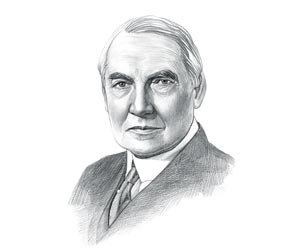|
|
|
|
|
The Mellon Plan was economic legislation passed by Congress in 1924 reducing taxes on the wealthy and businesses, advocating high tariffs and cuts in government spending and corporate taxes.
Mellon Plan Facts for kids: Fast Fact Sheet What was the Mellon Plan? The Mellon Plan was a package of economic legislation passed by Congress in 1924 advocating high tariffs and cuts in government spending and corporate taxes. Who was Andrew Mellon? Andrew Mellon (1855–1937) was a highly successful and extremely wealthy banker and industrialist who was first appointed the United States Secretary of the Treasury by President Harding. What did the Mellon Plan do? The Mellon Plan introduced policies which reduced taxes on the wealthy and the corporations and businesses in America that encouraged growth and led to the boom in stock market investments. When was Andrew Mellon Secretary of the Treasury? Andrew Mellon was the United States Secretary of the Treasury for nearly 11 years from March 4, 1921 to February 12, 1932. Andrew Mellon as Secretary of the Treasury: Andrew Mellon served as Secretary of the Treasury during the Republican administrations of Warren G. Harding (1921–1923), Calvin Coolidge (1923–1929) and Herbert Hoover (1929–1933). Facts about
Mellon Plan Andrew Mellon was a multi-millionaire, an industrialist and banker and one of the wealthiest people in the United States of America. He was appointed Secretary of the Treasury by new President Warren G. Harding in 1921. Andrew Mellon went on to serve as Secretary of the Treasury for during the Republican administrations of President Calvin Coolidge (1923–1929), and President Herbert Hoover (1929–1933). He was the mastermind behind the economic policies of the United States during the 1920's which included the 1926 Mellon Plan. His overall strategy was to apply business principles to the administration of the Treasury to which end he created the Bureau of the Budget and the General Accounting Office in the government. The Bureau of the Budget was established in 1921 as a part of the Department of the Treasury by the Budget and Accounting Act of 1921. The purpose of the Bureau of the Budget was to prepare the federal budget and to supervise its administration in executive branch agencies The General Accounting Office was established by the Budget and Accounting Act of 1921. The purpose of the General Accounting Office was to track government spending. His financial strategy formed the basis of the Mellon Plan was to lower taxes to free up money that could be then be invested in business to create jobs and improve the economy ensuring financial prosperity. The goals of the plan were to:
The Plan was proposed in 1924 as a program designed to lower tax rates. The plan called for limiting federal budget expenditures and using surpluses to reduce the debt. The Mellon Plan became the Revenue Act of 1924. By cutting government spending and reducing the interest paid on the WW1 government debt. Between 1921 and 1929 the plan reduced the nation's debt by $7 billion . The Plan was proposed in 1924 as a program designed to lower tax rates. The plan called for limiting federal budget expenditures and using surpluses to reduce the debt. The Mellon Plan became the Revenue Act of 1924. By cutting government spending and reducing the interest paid on the WW1 government debt. Between 1921 and 1929 the plan reduced the nation's debt by $7 billion . He was called "the greatest Secretary of the Treasury since Alexander Hamilton." and became a candidate for president in 1927 but lost the Republican nomination to Herbert Hoover. Applying the strategy of supply-side economics, based on the belief that changes in marginal tax rates influenced economic activity, the Congress dramatically reduced tax rates.
People had more money available and in the exuberance and period of prosperity in the Roaring Twenties led many people to invest, and over-invest, in the booming stock market. The tax laws were designed to put more money into the hands of the consumers by lowering the federal income tax. This contributed to the rampant spending trend of consumers, which in turn led to over production of goods. Refer to the Economic Boom of the 1920's and Consumerism in the 1920's. The 1929 Wall Street Crash hit the nation. Andrew Mellon's reputation was badly damaged as he, together with President Hoover and President Coolidge, was blamed for the financial disaster. |
| US American History |
| 1913-1928: WW1 & Prohibition |
|
|
|
|
|
First Published2016-04-19 | |||
|
Updated 2018-01-01 |
Publisher
Siteseen Limited
| ||
|
|

